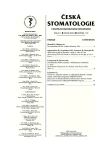-
Medical journals
- Career
Dental Condition in Children with Health Damage and Uncooperative Children after Treatment under General Anaesthesia
Authors: K. Ginzelová; M. Staňková; A. Buček; T. Dostálová
Authors‘ workplace: Dětská stomatologická klinika 2. LF UK a FN Motol, Praha
Published in: Česká stomatologie / Praktické zubní lékařství, ročník 110, 2010, 1, s. 3-8
Category:
Overview
Introduction:
The study evaluates the results gained from medical records documentation of Pediatric patients, who have undergone treatment under general anesthesia at the Pediatric Dentistry Department in the years 2006-2008.Aim:
The retrospective study analyzes the oral health status of the patients. Particularly evaluates the extent of the treatment. The aim of this article is to show the difference of the length of hospitalization between the groups of patients with different basic diagnosis. The study contemplates the distribution of groups according to sex and age.Materials and methods:
A sample of 831 children (489 males and 342 females) was evaluated. The statistically significant difference in oral health between boys and girls has been observed. The observational study has been conducted in the retrospective way from the documentation which was accessible due to signature of informed consent. The patients were divided into 14 groups according to their basic diagnosis.Results:
The total of 7794 teeth was intervened. Caries prevalence DMFT/dmft was examined at the age of 5, 12, and 15, the important groups according to the WHO classification. The influence of the handicap has been explored on the length of hospital admission rate. The average number of extractions and fillings for every group of patients at the same age was evaluated.Conclusions:
The use of general anesthesia in pediatric dentistry ward has a wide impact and especially for handicapped patients and patients who are not liable for treatment due to non-compliance. The successful treatment depends on the cooperation between the child patient, parents and dentist. The general anaesthesia enables effective, short and safe treatment of the patient, but also doubtless be surgical intervention severely burdening the organism of the child. It is .indicated for the patients with multiple caries and for the patients whose basic diagnosis does not enable the treatment in local anaesthesia.Key words:
general anaesthesia – DMFT/dmft - handicapped child patient - treatmentae
Sources
1. Broukal, Z., Krejsa, O., Mrklas, L., Mazánková, V., Pázlerová, V.: Analýza orálního zdraví u vybraných věkových skupin obyvatel České republiky. VÚS a ÚZIS, Praha, 2003.
2. Dougherty, N.: The dental patient with special needs: a review of indications for treatment under general anesthesia. Special Care Dentistry, 29, 2009, 1, s. 17-20.
3. Ginzelová, K.: Stomatologické ošetření handicapovaných dětí. Československá pediatrie, 50, 1996, 3, s. 178-179.
4. Ginzelová, K., Hechtová, D.: Laryngeální maska v dětské stomatologii. Quintessenz, 16, 2007, 5, s. 77-81.
5. Kolovratová, V., Dostálová, T.: Analgosedace v péči o dětského pacienta. Progresdent, 5, 2007, s. 8-11.
6. Krejsa, O., Broukal, Z., Mrklas, L.: Orální zdraví ve věku 5, 12 a 15 let v České republice 1998. Česká stomatologie, 101, 2001, 4, s. 43-50.
7. Lyons, R. A.: Understanding basic behavioral support techniques as an alternative to sedation and anesthesia. Special Care Dentistry, 29, 2009, 1, s. 39-50.
8. Martens, L. C.: Soins dentaires pour handicapes: problematique generale Dental care for the handicapped: general probléme Rev. Belge Med. Dent., 52, 1997, 2, s. 2-26.
9. Messieha, Z.: Risks of general anesthesia for the special needs dental patient. Special Care Dentistry, 29, 2009, 1, s. 21-25.
10. Pantuček, L., Kukletová, M., Halačková, Z., Izakovičová-Holá, L., Kuklová, J., Svobodová, M.: Stav chrupu u nespolupracujících dětí ošetřených na Stomatologické klinice v Brně v roce 2004. Praktické zubní lékařství, 55, 2007, 1, s. 1-9.
11. Pezzementi, M. L., Fisher, M. A.: Oral health status of people with intellectual disabilities in the southeastern United States. JADA, 136, 2005, s. 903-912.
12. WHO Oral Health Country / Area Profile Programme 2003 Oral Health Methods and Indices Caries Prevalence: DMFT, DMFS – www.whocollab.od.mah.se/expl/ orhdmft.html
Labels
Maxillofacial surgery Orthodontics Dental medicine
Article was published inCzech Dental Journal

2010 Issue 1-
All articles in this issue
- Alimentary Fluoride Intake in Children at the Age of 4 to 5 Years
- Orthodontic Treatment of a Patient with Facial Cleft (Part 1)
-
Výchova k zubnímu zdraví na základních školách
Desátý ročník výukového programu ZDRAVÉ ZUBY
(Souborný referát) - Dental Condition in Children with Health Damage and Uncooperative Children after Treatment under General Anaesthesia
- Czech Dental Journal
- Journal archive
- Current issue
- Online only
- About the journal
Most read in this issue- Orthodontic Treatment of a Patient with Facial Cleft (Part 1)
- Dental Condition in Children with Health Damage and Uncooperative Children after Treatment under General Anaesthesia
- Alimentary Fluoride Intake in Children at the Age of 4 to 5 Years
-
Výchova k zubnímu zdraví na základních školách
Desátý ročník výukového programu ZDRAVÉ ZUBY
(Souborný referát)
Login#ADS_BOTTOM_SCRIPTS#Forgotten passwordEnter the email address that you registered with. We will send you instructions on how to set a new password.
- Career

